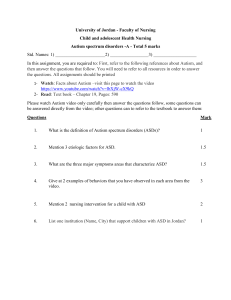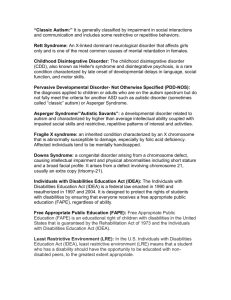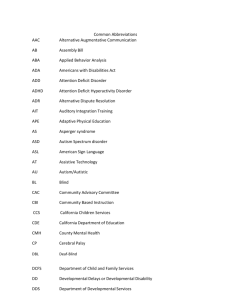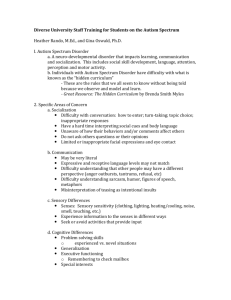Stress and coping strategies for parents of children with Autism
advertisement
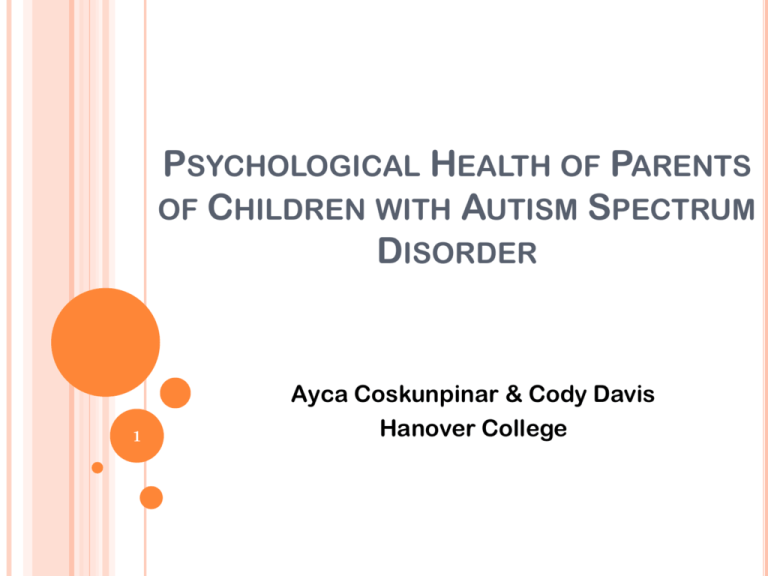
PSYCHOLOGICAL HEALTH OF PARENTS OF CHILDREN WITH AUTISM SPECTRUM DISORDER 1 Ayca Coskunpinar & Cody Davis Hanover College AUTISM SPECTRUM DISORDER Autism Spectrum Disorder is an umbrella term for 5 variations of Pervasive Developmental Disorders Autistic Disorder Rett’s Disorder Childhood Disintegrative Disorder Asperger’s Disorder PDD-Not otherwise specified 2 CHARACTERISTICS OF CHILDREN WITH ASD Challenges in communicating Difficult behaviors Social isolation 3 PSYCHOLOGICAL HEALTH OF ASD PARENTS Parents of children with ASD experience higher levels of parenting stress and higher levels of depression compared to parents of children with other disabilities, other healthcare needs, or no healthcare needs (Sheive, 2007) Parents experience felt and enacted stigmas (Gray, 2002) Sleep patterns of children with ASD are more problematic when compared to the patterns of typical children (Lopez-Wagner et al., 2008) 4 FRAGILE-X SYNDROME Associated with mental retardation, hyperactivity, short attention span, and perseverative speech Research on Fragile-X seems to show less effect on the stress of parents (Lewis et al., 2006) more challenges are presented for parents of these children compared to those of Down syndrome mothers are more pessimistic mothers report more conflict as well http://www.nichd.nih.gov/health/topics/developmental_disabilities.cfm 5 DOWN SYNDROME Associated with mild to moderate mental retardation, delayed language development, and slow motor development Parents of children with Down syndrome seem to experience less stress and more rewards compared to parents whose children have other disabilities and possibly even equal rewards compared to parents of “typical” children (Hodapp, 2001). http://www.nichd.nih.gov/health/topics/developmental_disabilities.cfm 6 “DOWN SYNDROME ADVANTAGE” As mentioned, parents of children with Down syndrome report lower stress levels than parents of children with other developmental disorders However, recent research suggests that this advantage disappears when certain socioeconomic markers are controlled, EXCEPT when the comparison group is parents of children with ASD (Stoneman, 2007) Stoneman (2007) suggests exploring this possible “autism disadvantage” 7 RESEARCH QUESTION Are there differences in the psychological health of parents of children with ASD, Down syndrome, and Fragile-X, as measured by stress, depression, and coping strategies used? 8 HYPOTHESIS Consistent with the notion of an “autism disadvantage” we expect to find that parents of children with Autism Spectrum Disorder will report higher levels of stress, higher levels of depression, and poorer coping strategies compared to parents of children with Down syndrome and Fragile-X Syndrome. 9 PARTICIPANTS 114 volunteer parent participants ASD = 24 Down syndrome = 31 Fragile-X = 31 Typical Children = 28 Other = 6 (excluded from the analysis) Male = 14, Female = 100 Mean age = 38 (range = 19 to 64) Predominantly Caucasian-American 10 INTERNET SITES USED TO GATHER DATA Down syndrome DownSyn Forum Fragile-X Fragile_X_Michigan Fragile X Yahoo Group Autism Spectrum Disorder ds-autism Other sites and support groups used included: Parents_of_special_needs_kids_DE_MD_PA@yahoogroups.com Timetotalk 11 MATERIALS Demographic Survey Stress Scale Depression Scale The Parental Stress Scale (PSS) Center for Epidemiologic Studies Depression Scale (CES-D), NIMH Coping Scale The Ways of Coping Inventory (WoC-Abbr) 12 The Parental Stress Scale (PSS) There are 18-items on the scale with higher averages indicating higher levels of stress. Scoring: 1 = ‘strongly disagree; 2 = ‘disagree’; 3 = ‘neutral’; 4 = ‘agree’; and 5 = ‘strongly agree.’ Sample Statement: Caring for my child(ren) sometimes takes more time and energy than I have to give. 13 CENTER FOR EPIDEMIOLOGIC STUDIES DEPRESSION SCALE There are 20-items in the scale, which we cut down to 12. Higher averages indicate more depressive symptoms. Scoring: 0 = ‘rarely or none of the time’; 1 = ‘some or a little of the time’ (1-2 days per week); 2 = ‘occasionally or a moderate amount of the time’ (3-4 days per week); 3 = ‘most or all of the time’ (5-7 days per week). Sample Statement: I felt that I was just as good as other people I felt depressed 14 THE WAYS OF COPING INVENTORY This inventory is made up of 44 statements, which we cut down to 25 statements. Scoring: 1 (if the strategy was used) and 0 (if the strategy was not used in raising the child). Has subscales measuring the following: ProblemFocused Coping and Emotion Focused Coping PFC: Made a plan of action and followed it. EFC: Criticized or lectured yourself. 15 RELIABILITY Depression Scale: = .849 Stress Scale: = .869 Coping Scale (Problem Focused): = .794 Coping Scale (Emotion Focused): = .755 16 RESULTS A univariate analysis of variance was used to compare the means of the three groups on the stress, depression, and coping measures. The results did not change when analyses controlled for markers of socio-economic status. 17 Down syndrome parents were less depressed than all other groups (p < .001) 18 Parents of children with Down syndrome were significantly less stressed than parents of children with Fragile-X (p < .001) and parents of typically developing children(p < .01) 19 Parents of children with Autism (p < .001), Down syndrome (p < .05), and Fragile-X (p < .05) used problem-focused coping significantly more than the parents of typically developing children. 20 Parents of children with Down syndrome used significantly less emotion-focused coping than parents of children with Autism (p < .05), and parents of children with Fragile-X (p < .01) 21 DISCUSSION We found no evidence for an autism disadvantage in terms of either stress or depression. One reason is that parents of autistic children in our sample engaged in relatively high levels of problemfocused coping. Problem-focused coping has led to more positive outcomes for parents of children with many disabilities, and parents of ASD show the same results. 22 DISCUSSION CONTINUED… Previous research supports the findings that problem-focused coping in parents of children with ASD leads to higher levels of maternal wellbeing, regardless of symptomatology (Gray, 2006; Smith et al., 2008) In recent years, more social support has been available to parents of children with ASD: increased Autism awareness campaigns spotlight articles in major magazines fundraisers for ASD, and many other social support networks 23 DISCUSSION CONTINUED… Research supports previous studies on the “Down syndrome advantage” and even surpasses the “advantage” proposed by past research. Even when controlling for all socioeconomic markers, a significant advantage was found compared to all other research populations. In addition, we also found a “Down syndrome advantage” when compared to the parents of typically developing children. 24 FUTURE RESEARCH Use more socioeconomic markers for research comparison of groups Complete a more in-depth analysis of types of coping skills and strategies Get more confirmation that our control group is actually made up of parents of “typical” children 25 QUESTIONS? 26

